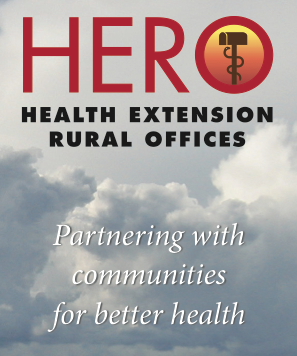 For more information or to get involved, contact:
For more information or to get involved, contact:
Karen Armitage, MD, FAAP
KArmitage@salud.unm.edu
505-272-5377
MSC 09 5065
1 University of New Mexico
Albuquerque, NM 87131
Phone: (505) 272-5377
karmitage@salud.unm.edu
 For more information or to get involved, contact:
For more information or to get involved, contact:
Karen Armitage, MD, FAAP
KArmitage@salud.unm.edu
505-272-5377
MSC 09 5065
1 University of New Mexico
Albuquerque, NM 87131
Phone: (505) 272-5377
karmitage@salud.unm.edu

December 2012
Thirty instructors in Mental Health First Aid certified to train hundreds in all walks of life to address the mental health crisis in New Mexico. 
The Northern HERO office (NoHERO) had been hearing tremendously heartfelt stories throughout north-central NM, and during V2020 visits with partners, that spoke of critical gaps in rural and remote communities around mental health and well-being that translates into real lives in the balance: NM ranks 5th in the nation for suicide, with those disparities even higher for rural New Mexicans. In response, Juliana Anastasoff, Northern Region HERO approached a university partner, Dr. Helene Silverblatt, at the UNM Center for Rural & Community Behavioral Health (CRCBH) for assistance to seek funding to bring the nationally recognized “Mental Health First Aid” program to New Mexico. We collaborated to form an inter-agency planning group around the initiative, and assisted with designing and writing the grant to provide the funding to train a network of 30 certified MHFA instructors across the state to deliver training to a wide range of “first aiders”, including health and social service professionals, the faith community, consumers, law enforcement, schools, and volunteer EMS-fire departments that cover the frontlines in rural New Mexico.
However, there is very little research on MHFA in the U.S. - communities, providers, and care systems need more information on the impact and outcomes in order to uptake this life-saving intervention, and particularity, how applicable and appropriate the standardized curriculum is for rural, tribal, and underserved communities. Dr. Annette Crisanti from CRCBH secured two small research grants that can lead to larger grants in the future. What we learn in NM will be of vital interest to other rural, western states that also rank at the top of the list in suicides, and have among the highest rates of mental health-health professions shortage areas (MH-HPSAs) in the U.S. Additionally, the findings can be used to shape and promote policy to address health disparities and workforce shortages in the area of mental health, and to contribute to revisions of the standardized curriculum at the national level, so it more accessible and effective to diverse communities.
Finally, HSC’s leadership in this initiative has contributed to the development of a statewide network of trainers and organizations committed to disseminating MHFA in NM. In doing so, we distinguished NM as having the largest per-capita number of MHFA instructors in the nation. As a mental health first aid instructor, the NoHERO will be able to ensure that life-saving MHFA training is accessible and available to the communities, service providers, and care systems in the rural North, including UNM health professions students in rural rotations. Additionally, the NoHERO is providing technical assistance to organizations interested in implementing MHFA training for all their employees, thus strengthening their capacity and interface with crisis and mental health systems of care.
We anticipate end outcomes that impact health disparities by supporting the broader uptake of evidence-based practice that builds stronger rural capacity to deal with mental health issues & emergencies AND we'll learn about and disseminate findings related to barriers to the uptake of these best practices in rural and ethnically diverse communities that are mental health HPSAs. For more information, contact Juliana Anastasoff, the Northern HERO at janastasoff@salud.unm.edu.